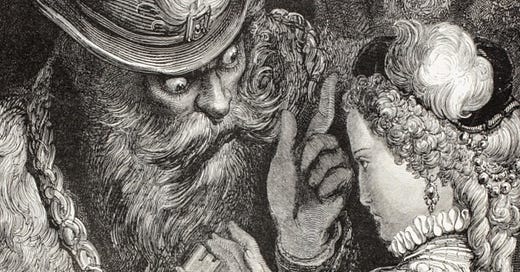Lately, I’ve been rereading Maria Tatar’s excellent study, The Hard Facts of the Grimm’s Fairy Tales. Although her book focuses on the Brothers Grimm, she has an interesting discussion of Charles Perrault’s version of “Bluebeard,” which relates a bit to our current scene.
In Perrault’s “Bluebeard,” if you recall, Bluebeard is a monstrous figure. Although incredibly rich, Bluebeard was “unlucky” to be born with a blue beard which made him so ugly that no woman was remotely interested in him. In fact, he frightened them. Women were also standoffish because of his many past wives, who all had mysteriously disappeared. Still, many of these same women eventually overlooked Bluebeard’s ugliness and checkered past after partying at his exotic estates. As Perrault writes:
“The time was filled with parties, hunting, fishing, dancing, mirth, and feasting. Nobody went to bed, but all passed the night in rallying and joking with each other. In short, everything succeeded so well that the youngest daughter [of an aristocrat] began to think that the man's beard was not so very blue after all, and that he was a mighty civil gentleman.”
One of these women, the maiden in Perrault’s “Bluebeard,” decided to completely overlook Bluebeard’s shortcomings and marry him.
Shortly after the marriage, Bluebeard had to be away for a number of weeks. He gave his new wife a number of keys to rooms that held his riches but said there was one closet she could never enter, which, in fairy tales, is the equivalent in horror movies of telling teenagers not to screw on the family’s couch on Halloween when their parents aren’t home.
So of course Bluebeard’s wife eventually opens the closet and finds dismembered versions of Bluebeards previous wives. She then drops the key, which falls into a pool of blood that she can’t wash off. When Bluebeard discovers this violation of his will (that damn bloody key!), he decides to add her to the pile of corpses and nothing she says can dissuade him. Fortunately, at the end of the tale, her brothers are notified about her situation, arrive at Bluebeard’s castle, and slay him.
But here’s the interesting part of the story. Although we can all sympathize with Bluebeard for being born with a blue beard, his situation doesn’t offset the fact that he’s a brutal serial murderer.
And yet . . . and yet . . . most critics of the Perrault tale over the previous centuries, mostly men, have not seen it that way. They have argued that it’s a cautionary tale about women’s “curiosity” and “superficiality.” Bruno Bettelheim goes so far as to say that the stained key symbolizes “marital infidelity,” the key being a phallic symbol of infidelity. The drawing that begins this post (by Gustave Dore), suggests such a reading.
Considering these past analyses of the tale, Maria Tatar writes:
“These critics [the ones who judge the wife harshly] invite us to view the heroine’s quite legitimate curiosity as a perversion (or at least a serious peccadillo), one that brings in its wake serious regrets. [To these critics] the genuinely murderous rages of Bluebeard would have presumably never been aroused had it not been for the (symbolic) infidelity of his wives. As horrifying as those multiple crimes may be, they still do not succeed in deflecting attention from the heroine’s single transgression.”
In short, as J.D. Vance might put it, Bluebeard is the “victim” here. The real culprits are those superficial, curious, childless cat ladies.
I mention this fairy tale and Vance to warn all my lady friends: strap on, fair damsels, the time of Bluebeard is upon us again. I am talking about all those cartoonish Bluebeards wanting to run the justice system and control our health care, who are obsessed with taking away the rights of a woman to make decisions about their bodies, whose main qualifications for office are King-Kong chest beating and sexual assault.
I know these guys well. I’ve come up against them myself since the day I popped out of my mother’s womb, thinking, in my baby’s brain, “What the fuck?”
So allow me to end with a prose poem from my While the Undertaker Sleeps: Collected and New Poems While the Undertaker Sleeps, which has a bit of fun with these Bluebeards.
Pirates
I’m agitated when I read of pirates. Growing up, I walked so many planks my feet were a mess of splinters. Supposedly, very few pirates made prisoners walk the plank, more productive putting them to work. But my Bluebeards needed that paternal loin tug one derives from the sound of a young, healthy male splitting the waves. Continually saved by mermaids, waterlogged, I persisted, devouring my share of limes, yet unable to please these master mariners, always more and more examinations: “Subtract the number of Ali Baba’s thieves from the number of Arabian Nights, then add the Voyages of Sinbad. What do you get?” Or “Repeat fifty times: ‘Making merry maps for mighty marooned mariners.’”
Insatiable they be, and everywhere.
You can find Peter Johnson’s books, along with interviews with him, appearances, and other information at peterjohnsonauthor.com
His most recent book of prose poems is While the Undertaker Sleeps: Collected and New Prose Poems
His most recent book of fiction is Shot: A Novel in Stories
Find out why he is giving away his new book of prose poem/fragments, even though he has a publisher for it, by downloading the PDF from the below link or going to OLD MAN’S homepage. His “Note to the Reader” and “Introduction” at the beginning of the PDF explains it all: Observations from the Edge of the Abyss





The last sentence nails it. Almost aphoristic.
Beards are the mark of the goat, and given the goat's lustful
and diabolical character, its kinship with satyrs and other classical
embodiments of lubriciousness, like the god Pan, beards define
the male in a priapic mode. Bluebeard is Jack the Ripper in priapic mode.